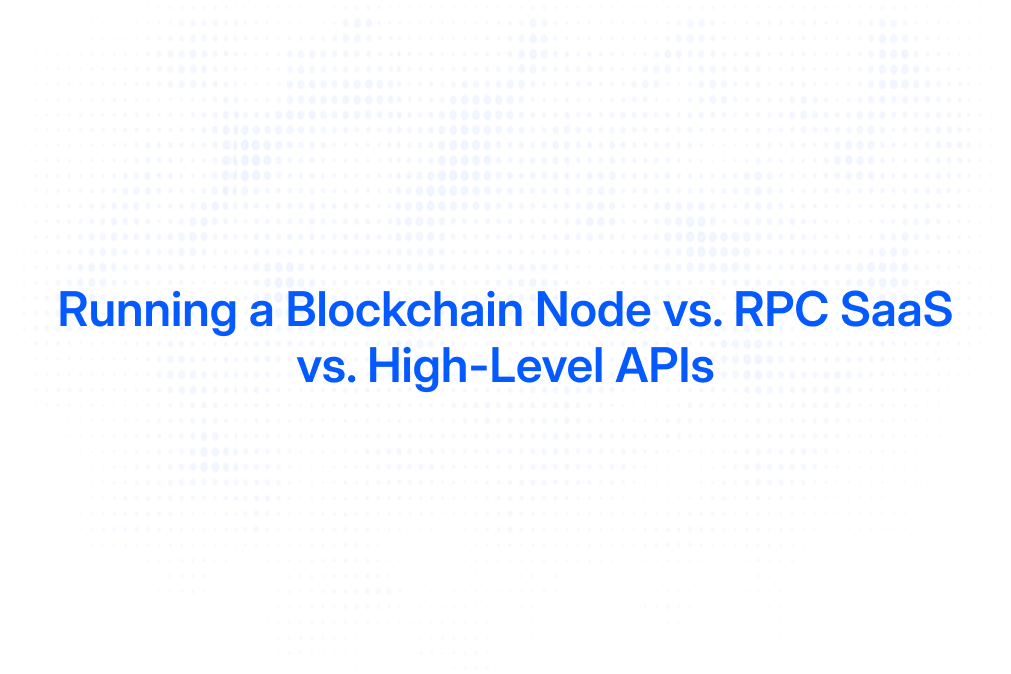The ABCs of Crypto Gas Fees: What They Are and Why They Matter
Kevin Callahan
.png)
Opening the Gas Station
Strolling through the alley of the crypto world, you might often bump into the term 'gas fees'. But what are these fees? How do they impact your crypto transactions on Ethereum network? This blog series aims to put a magnifying glass over these questions and elucidate how solutions like Uniblock can make this complex journey somewhat more navigable.
Tracing the Smoke Of Crypto Gas Fees
Just as a car needs fuel to run, transactions or operations on the Ethereum network need 'Gas' to execute. Gas fees, therefore, are essentially the transaction costs for performing operations on the Ethereum blockchain. Amid the myriad opportunities offered by the Ethereum network, handling gas fees poses some of its challenges. Understanding the fee structure, including the gas price, gas limit and how they translate into transaction costs, is crucial in optimizing your interactions with blockchain technologies.
Diving Into the Gas Pool
But let's dive a little deeper. Gas fees in crypto are determined by the gas price and the gas limit. The gas price is the amount of Ether you’re willing to spend on each unit of gas, and the gas limit is the maximum amount of gas you’re willing to consume in a transaction. Now the transaction confirmation speed on Ethereum heavily depends on gas fee - the higher you're willing to pay, the quicker your transactions get processed. But the question remains - how to set the right gas fee? That's where Uniblock's optimization techniques shine.
Uniblock at the Gas Station
Navigating Ethereum's gas fee landscape can be intricate. While many tools offer gas estimations, Uniblock stands out by adopting an aggregated approach. Instead of just another tool, Uniblock acts as a unified platform, assimilating the finest features from available gas estimation tools. This ensures users always receive the most optimal, seamless experience.
Though our current unified APIs don’t provide direct gas API integrations, Uniblock adeptly facilitates gas estimations through our launcher packages. And with the potential for diverse gas API integrations in the future, we ensure our users are always one step ahead.
To illustrate how this works in a real-world scenario, consider querying a specific transaction. By making a call with the specific chainId and transactionHash parameters as seen in the URL https://api.uniblock.dev/uni/v1/transaction?chainId=1&transactionHash=0xbac9e1b028fc1bddaa43495bbb1da0d076699c5619c43e3f8022aca50a1351ce, you can retrieve a comprehensive breakdown of that transaction. The response provides users with data such as:
This transparency in transactional data, including specific gas values, ensures users are always well-informed.
Sample JavaScript Implementations
For retrieving details of multiple transactions (read more here https://docs.uniblock.dev/reference/transactioncontroller_gettransactions):
For fetching details of a single transaction (read more here https://docs.uniblock.dev/reference/transactioncontroller_gettransaction):
By providing a comprehensive view of the gas domain combined with seamless access to transaction details, Uniblock ensures users always have the best tools and information available.
Fuelling Forward
Deciphering the gas fee structure not only enhances your crypto transaction experience but also lends you a competitive edge in the fast-paced crypto market. As you continue interacting with the blockchain world, remember that the right tools can simplify the complex. So, ready to rev up your engines and optimize your gas costs with Uniblock? Keep this discussion going and drop your queries, experiences, or thoughts on the whole "gas" affair. How important are gas fees to you in your Decentralized Finance journey? Let's gas about it!
.svg)


.png)



